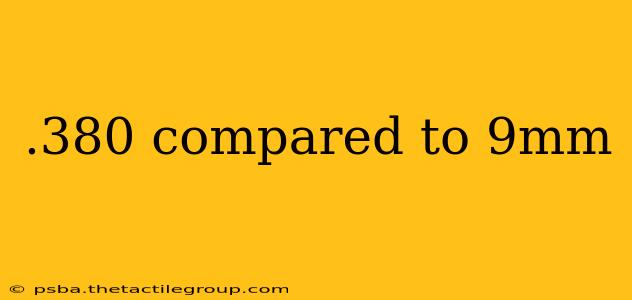Choosing the right caliber for self-defense or concealed carry is a crucial decision, and the .380 ACP and 9mm Parabellum are two of the most popular options. This detailed comparison will delve into the key differences between these cartridges, examining their ballistics, recoil characteristics, ammunition availability, and suitability for various applications. We'll help you understand which caliber might be the better choice for your specific needs.
Ballistics: Power and Penetration
The most significant difference between the .380 ACP and 9mm lies in their ballistic performance. The 9mm boasts considerably more energy and stopping power due to its larger size and higher velocity.
-
9mm: Typically delivers significantly higher muzzle energy and velocity, resulting in greater penetration and a wider wound channel. This translates to a higher likelihood of incapacitating a threat.
-
.380 ACP: Offers less muzzle energy and penetration compared to the 9mm. While effective at close range, its smaller size limits its effectiveness against heavier clothing or at longer distances.
Table: Ballistic Comparison (Approximate Values)
| Cartridge | Muzzle Energy (ft-lbs) | Muzzle Velocity (fps) | Penetration (inches) |
|---|---|---|---|
| 9mm (115gr FMJ) | 350-400 | 1100-1200 | 12-16+ |
| .380 ACP (95gr FMJ) | 150-200 | 850-950 | 8-12 |
Note: These values vary depending on the specific ammunition, barrel length, and firearm.
Recoil: Shootability and Control
Recoil is a significant factor to consider, especially for smaller-framed individuals or those new to firearms.
-
.380 ACP: Known for its significantly lighter recoil, making it easier to control and shoot accurately, even for beginners. This can translate to faster follow-up shots.
-
9mm: Produces more noticeable recoil, which can be challenging for some shooters, especially during rapid firing. However, with proper training and technique, recoil management becomes manageable.
Ammunition Availability and Cost
Both calibers enjoy widespread availability, but the 9mm generally has a wider selection of ammunition types, including various defensive rounds (hollow points, etc.) at competitive prices.
-
9mm: Extremely common and readily available, with a vast range of options in terms of bullet weight, type, and manufacturer.
-
.380 ACP: Also widely available, but generally has a more limited selection compared to the 9mm.
Firearm Selection and Concealability
Both calibers are offered in a wide variety of firearms, many designed for concealed carry.
-
.380 ACP: Often found in smaller, lighter, and more easily concealed pistols, making them a popular choice for deep concealment.
-
9mm: Available in a broader range of firearm sizes and styles, including compact and subcompact pistols suitable for concealed carry, but generally larger and heavier than .380 ACP firearms.
Conclusion: Choosing the Right Caliber
The "better" caliber depends entirely on individual needs and priorities.
-
Choose .380 ACP if: You prioritize lighter recoil, smaller and more easily concealable firearms, and are less concerned about extreme stopping power. This is a great option for beginners or those prioritizing comfortable shooting.
-
Choose 9mm if: You prioritize stopping power, greater penetration, and a wider selection of ammunition. While having more recoil, the 9mm's superior ballistic performance makes it a highly effective self-defense cartridge with proper training.
Ultimately, the best approach is to handle both calibers, if possible, to determine which feels more comfortable and controllable for you. Consider factors like your physical build, shooting experience, and the specific self-defense or concealed carry situations you anticipate. Remember, proper training and practice are crucial regardless of your chosen caliber.

